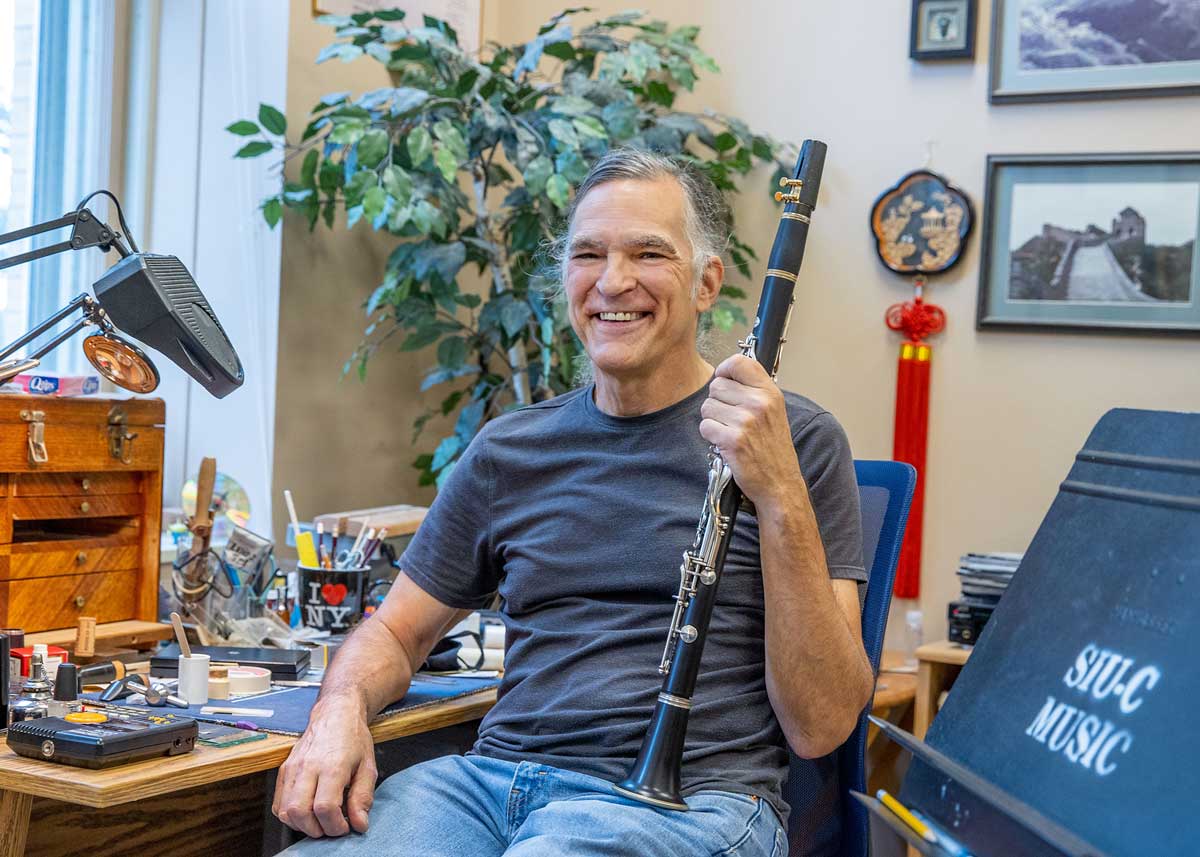
He’s a world-renowned clarinetist and composer who has helped Southern Illinois University Carbondale students unlock their potential for more than four decades.
“I think the key components are that the secrets to their success are already there inside,” said Eric P. Mandat, who has been with SIU Carbondale’s School of Music for 43 years and is now a visiting professor of clarinet. “If they have a vehicle to express outwardly those things that they are feeling inside, that is going to lead to what I call a success. That’s what I want them to have. I want them to know who they are and to be able to access that, pull it out and share it with others, and things will go fine for them.”
What started with Mandat, then a toddler, listening to an “Instruments of the Orchestra” album with an older brother has evolved into a career spanning the world as a concert artist, including international festivals in Europe, Asia, South America and the United States. Mandat has written between 50 and 55 non-jazz compositions and an estimated 20 jazz compositions and is widely recognized for his clarinet extended performance techniques with multiphonics and microtones. His latest CD, “Lines and Shadows,” which features Mandat and other clarinetists, was released this summer.
Mandat, who retired from SIU in 2015 as a distinguished professor, came to the university in 1981 as a clarinet and saxophone instructor shortly after earning his master’s degree from the Yale University School of Music. He earned the university’s Scholar Excellence Award for his research and creative work in 1999. He lives in Carbondale with his wife, Olise.
Sold on the clarinet
Mandat’s mother played the piano, and his father, the accordion. Mandat recalls becoming excited when he heard the clarinet on a record when he was about 3 years old.
“It was fun. It was passionate. It was all over the place.” And it had an “exciting sound” compared with other instruments, he said.
In fourth grade, Mandat was playing piano but started playing clarinet in the school band. He, and other students, discussed quitting after the December 1966 Christmas concert. His parents told him they would return the rented clarinet. But, Mandat said, he couldn’t sleep the night before it was to be returned and told his parents he didn’t want to quit.
In a thank you note to his aunt shortly after her holiday visit to the family’s Lookout Mountain, Colorado, home, Mandat, then 9, included, “I decided to keep my clarinet. We are going to pay for it. I’m going to play very hard on it.”
The nearly 58-year-old note is framed on a wall in Mandat’s Altgeld Hall office as a priceless memento.
“When my aunt got it, she must have right away put it in a safe place because it’s in pristine condition,” he said.
Mandat’s passion for the clarinet continued to evolve. While in high school, where he was in the high school band, Mandat was chosen first chair clarinet for America’s Youth in Concert band and choir’s tour of Europe.
“I think I enjoyed everything surrounding playing clarinet. Not only the playing, which was great. It was my breath making these sounds and that felt like such an honest expression,” Mandat said. “I didn’t have to come up with words or things like that. It was just who I was, and I enjoyed tasks of any kind like working my way through the lessons, that was always a thing for me and that continued in music.”
Instructors were pivotal
Mandat credits his private clarinet instructor, Richard Joiner, a principal clarinetist with the Denver Symphony, with instilling enthusiasm during each Saturday morning lesson. Joiner would come to lessons excited that the symphony would be playing works like the “Barber of Seville” overture, even though he had likely performed those pieces many times.
“I thought if I can do that with my life and feel that fresh after the 100th time I’ve done something then that is what I want,” Mandat said. “That’s what I aspired to, from that kind of experience. He was pretty much that way about everything. He was a beautiful, pleasant, gentle human being, and that made a huge impression on me. He loved music. He really, really loved his music; whatever he was playing he was all in, and I could feel that. That’s what I wanted.”
In addition to working with SIU music students, Mandat also teaches pre-college and adult students. It’s important to connect with students on their interests apart from music so they can grow and excel.
“Whatever kids are into I’m into, and I want them to understand that when they have the instrument in their hands it’s their time,” Mandat said. “Everything that is exciting to them relates to this instrument. Whether they choose this instrument as their means of expression later in life or something else, at least they know that they were in this place, and they will embrace it all the way.”
A new approach to playing
Mandat said he was captivated by the sounds of traditional non-Western wind playing, even more so than the Western-style traditional playing of a clarinet in orchestral and chamber music settings. After being hired at SIU, he was able to focus on different ways of playing the clarinet, using “non-traditionally Western fingerings to create sounds not normally associated with the clarinet.”
Many students come to work with Mandat to explore ways they can “create a more complete and unique personality” through their instrument, he said.
Rather than playing notes on a page “the way they are supposed to be played, my idea is you want to infuse as much of yourself into what you are doing artistically,” Mandat said.
Mandat’s ensemble work included a 15-year collaboration with the Chicago Symphony’s MusicNOW, and for more than 25 years, he was a member of Tone Road Ramblers, an eclectic sextet improvisation group. Now 66, Mandat continues to play as a soloist and is “always looking for people to play with.” Mandat noted, with a chuckle, that performing as he has in a one-person show for an hour isn’t as easy as it used to be, but he is continuing to compose, including educational music.
The Illinois Music Educators Association recently commissioned Mandat to compose new all-state audition material for junior-level and senior-level clarinet and bass clarinet, essentially replacing eight études — compositions to demonstrate skill — for fall 2025 competitions.
“I’m super excited about that. It means that every junior high and high school clarinetist and bass clarinetist who wants to get into these elite bands will play my music,” he said. “I have to meet the kids where they are in proficiency. I love writing educational materials.”







